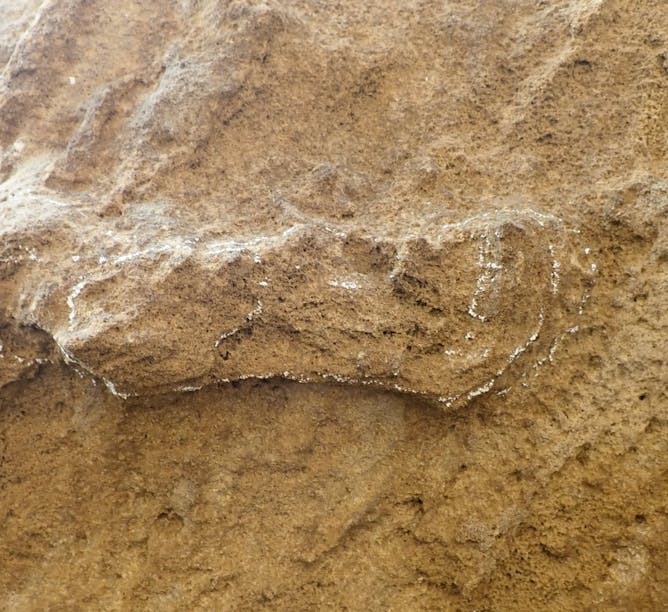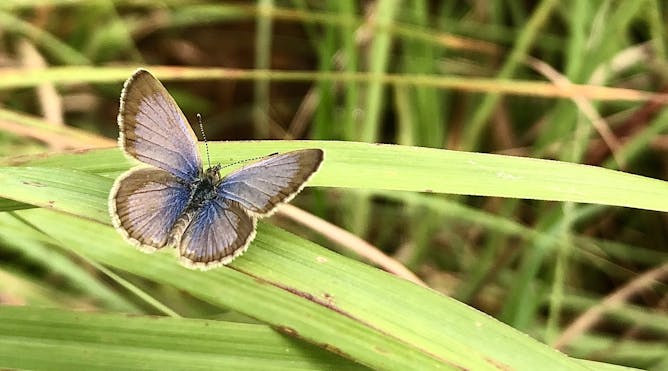|
Whenever I take a walk on one of Cape Town’s beautiful beaches, I like to pause and look back at my footprints and those of fellow strollers, whether they’re people, dogs or birds. Charles Helm and Andrew Carr do exactly the same thing – but, armed with specialist skills and world-class technology, they set their sights on ancient tracks left in long-ago sand dunes on another stretch of South Africa’s coast. That’s how they identified something truly
remarkable: a footprint left by one of our human ancestors 153,000 years ago. So far, it’s the oldest footprint in the world attributed to our species, Homo sapiens.
We’ve all fallen victim to a seductive sales pitch and ended up buying something we didn’t need. For the most part the odd poorly judged purchase doesn’t hurt our finances. But it’s quite different if we fall for someone’s persuasive talk about amazing returns if we entrust our life savings to them. So how can we tell whether an investment offer is too good to be true? Bomikazi Zeka and Abdul Latif Alhassan set out how to spot fraudulent “get-rich-quick”
schemes.
|

|
Natasha Joseph
Commissioning Editor
|
|

Charles Helm, Nelson Mandela University; Andrew Carr, University of Leicester
This was an area in which early anatomically modern humans survived, evolved and thrived, before spreading out of Africa to other continents.
|

Bomikazi Zeka, University of Canberra; Abdul Latif Alhassan, University of Cape Town
Avoid ‘get-rich-quick’ schemes. They are, more often than not, bogus and fraudulent business ventures.
|
Arts, Culture + Society
|
-
Amira Osman, Tshwane University of Technology
Both residents and Sudanese in the diaspora invested in homes to secure the future. Now the conflict is destroying hope.
-
Akinwumi Ogundiran, University of North Carolina – Charlotte
We need deep-time African urban history and theories to make sense of contemporary urban life and anticipate its future possibilities in African terms.
-
Gibson Ncube, Stellenbosch University; Adriaan van Klinken, University of Leeds
His books bring north Africa into conversation with sub-Saharan Africa about lived queer experiences.
|
|
Science + Technology
|

Charl Deacon, Stellenbosch University
Butterflies are sentinel species – their interactions with landscapes help scientists understand other insects better.
|
Health + Medicine
|
-
Anja du Plessis, University of South Africa
The current cholera outbreak is not necessarily an issue with potable water. It’s the result of a combination of factors including dysfunctional and non-compliant wastewater treatment works.
-
Akebe Luther King Abia, University of KwaZulu-Natal; Afsatou Ndama Traore, University of Venda; Natasha Potgieter, University of Venda
Wastewater treatment plants receive wastewater from a variety of sources. This makes them useful proxies for determining the burden of antimicrobial resistance in communities.
|
|
Business + Economy
|

Nnaemeka Vincent Emodi, The University of Queensland
Dangote refinery will reduce Nigeria’s dependence on imported petroleum products and create jobs. But it may not be the best for the environment.
|
Politics
|
-
Mukesh Kapila, University of Manchester
The failure to hold the perpetrators of the Darfur genocide accountable has led to further instability in Sudan.
-
Moses B. Khanyile, Stellenbosch University
Allegations of flouting international arms control rules, let alone being party to the Russia-Ukraine conflict, place the South African defence industry in a precarious position globally.
-
Gilbert M. Khadiagala, University of the Witwatersrand
If the African delegation could convince the belligerents to find a peaceful solution, they will make a critical contribution to the climate for mediation.
-
Chris Changwe Nshimbi, University of Pretoria; Nelson Alusala, University of Pretoria
An African-led process would take into account complex regional dynamics – which would lead to a better and more stable peace agreement.
|
|
Education
|

Karen Roux, University of Pretoria
Political will is key to tackling pupils’ literacy struggles.
|
| |
|
|
|
|
| |
| |
| |
Would you like to republish any of these articles?
|
|
It’s free to republish, here are the guidelines.
Contact us on africa-republish@theconversation.com in case you need assistance.
|
| |
| |
| |
| |
|
|